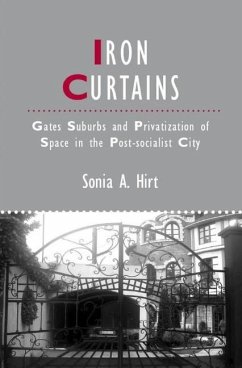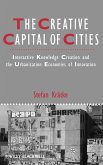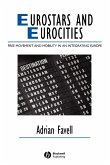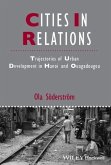Iron Curtains has been awarded Honorable Mention for the 2013 ASEEES Harvard Davis Center Book Prize! The prize is sponsored by Harvard University's Davis Center for Russian and Eurasian Studies and is awarded annually by the Association for Slavic, East European, and Eurasian Studies, for an outstanding monograph published on Russia, Eurasia, or Eastern Europe in anthropology, political science, sociology, or geography.
Utilizing research conducted primarily with residents of Sofia, Bulgaria, Iron Curtains: Gates, Suburbs, and Privatization of Space in the Post-socialist City explores the human dimension of new city-building that has emerged in East Europe.
Features original data, illustrations, and theory on the process of privatization of resources in societies undergoing fundamental socio-economic transformations, such as those in Eastern Europe
Represents the sole in-depth monograph on contemporary urbanism in Southeast Europe
Makes a broader statement on issues of urbanism in Europe and other parts of the world while highlighting the complex connections between cultures and cities
Hinweis: Dieser Artikel kann nur an eine deutsche Lieferadresse ausgeliefert werden.
Utilizing research conducted primarily with residents of Sofia, Bulgaria, Iron Curtains: Gates, Suburbs, and Privatization of Space in the Post-socialist City explores the human dimension of new city-building that has emerged in East Europe.
Features original data, illustrations, and theory on the process of privatization of resources in societies undergoing fundamental socio-economic transformations, such as those in Eastern Europe
Represents the sole in-depth monograph on contemporary urbanism in Southeast Europe
Makes a broader statement on issues of urbanism in Europe and other parts of the world while highlighting the complex connections between cultures and cities
Hinweis: Dieser Artikel kann nur an eine deutsche Lieferadresse ausgeliefert werden.
This masterful and wide-ranging exploration of an 'ordinary' city in the postsocialist world - an area which has been largely overlooked by theorists of modernity and postmodernity - brings important and unexpected insights into the nature of contemporary urbanism and the postmodern cultural condition more generally. Timely, interesting and extremely engaging, the book also stands out for its skilful and seamless integration of a wealth of detailed observation with a strongly theoretical approach.
--Ekaterina Makarova, University of Virginia
Drawing from deep personal insight as well as 100 interviews, Hirt describes a shift from "bland to brass," sheds light upon privatism as a cultural condition, and reveals prospects for rejuvenating the public realm in the global context. This compelling and passionate account about why the post-wall world is so busy building walls fills a gaping hole in the literature on urbanism.
--Nan Ellin, University of Utah
--Ekaterina Makarova, University of Virginia
Drawing from deep personal insight as well as 100 interviews, Hirt describes a shift from "bland to brass," sheds light upon privatism as a cultural condition, and reveals prospects for rejuvenating the public realm in the global context. This compelling and passionate account about why the post-wall world is so busy building walls fills a gaping hole in the literature on urbanism.
--Nan Ellin, University of Utah
"This masterful and wide-ranging exploration of an 'ordinary' city in the postsocialist world - an area which has been largely overlooked by theorists of modernity and postmodernity - brings important and unexpected insights into the nature of contemporary urbanism and the postmodern cultural condition more generally. Timely, interesting and extremely engaging, the book also stands out for its skilful and seamless integration of a wealth of detailed observation with a strongly theoretical approach." -- Ekaterina Makarova, University of Virginia








